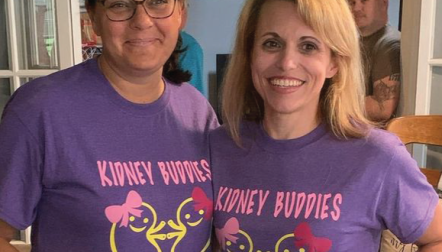
Blog post
Confessions of a first-time dialysis patient — Week 1

Today was my first day of dialysis at the local dialysis clinic. I have been waiting on this day for a long time and I realized once I got here that you can never truly prepare yourself for what you are about to experience.
Fortunately, I have an amazing nephrologist who has done a great job in preparing me for what to expect physically. I have learned that the mental aspect would be much harder to prepare for. The biggest hurdle mentally is learning how to cope with dialysis during the first week or so. You spend a lot of time observing what is going on around you: the sounds, sights and even the smells.
When I first arrived at the clinic, a group of nurses welcomed me, pressing a button to allow me back to the area where people are dialyzed. When you get to the back where the dialysis machines are, you step on a scale where they will weigh you to get a baseline of where you stand with fluid retention. Depending on if you have a port or a fistula, you will need to thoroughly clean the area on your arm where the needles will go. I remember constantly looking around at the people in the dialysis center with me and wondering what their story was and how we all ended up here at this moment together. They seemed so somber and quiet.
As I was escorted to my chair, I noticed that each chair looked comfortable and came with its own television and headphones. One thing I noticed immediately was that you are very close to your neighbors on either side of you. You keep a dialysis schedule each week, so you will see the same people each week. I felt like the new kid walking into school today, but the friendliness and welcome from my dialysis neighbors eased my mind. As I began my dialysis treatment, I noticed quickly how quiet it was in the clinic. When you close your eyes, almost all you can hear is a hum that sounds like a movie projector. Nobody talks, most are covered from head to toe in a blanket, and the nurses move about quietly as they go from machine to machine checking in.
It is very important to ask as many questions as possible while you are there. You can never ask too many questions when it comes to starting dialysis. Ask about what to eat and drink, how to take care of your fistula, how to keep your port from becoming infected, and what you can do to better prepare for future appointments. I am writing this trying to paint a very realistic and true picture of dialysis, but also to let you know that everything will be OK! Remember to look at dialysis as a comma in your life, not a period. It is not the best, most exciting thing in your life, but it most certainly is not the worst. Use your experience to help others who may be worried. Ease their minds with writing, engaging and letting them know they are not alone. I wish you the best of luck if you are about to start your journey of dialysis. Know that you are a blessing to others and can be inspirational if you choose. Dialysis is not a choice, but how we decide to take advantage of it is.





